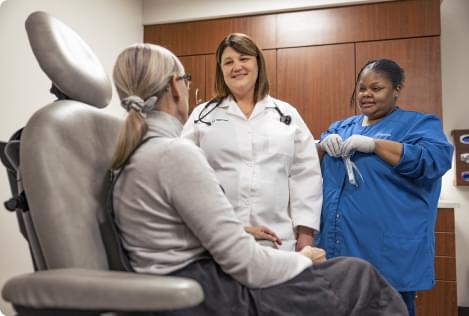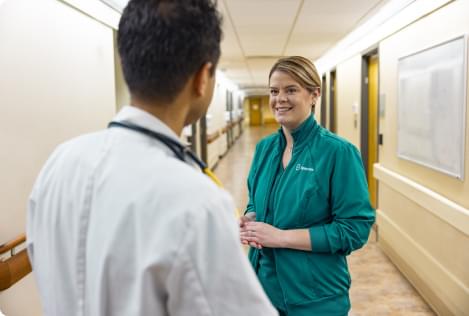Lansing Pediatric Rehabilitation Occupational Therapists specialize in improving independence in dressing, bathing and other daily activities as well as improvement in developmental play skills, while increasing arm strength, improving vision and increasing core strength in children from birth to 18 years of age.
UM Health-Sparrow therapists use the most up-to-date therapeutic approaches to achieve the best possible outcome for your child. Every family receives an individualized approach, working toward personal goals and striving toward the child’s highest level of independence. A comprehensive assessment will be completed on your child including range of motion, strength, activities of daily living, visual motor, fine motor coordination, cognitive deficits, sensory deficits, and functional mobility. Your occupational therapist will assess and develop a treatment plan that is specific to the needs of your child using evidence based techniques. Your child’s therapist will work closely with your family and the entire health care team to ensure a safe return home.
Developmental Treatment
The use of therapeutic techniques and caregiver education to promote developmental skill progression. Your child’s therapist will use facilitation, positioning and play to promote your child’s ability to progress through developmental stages. All Caregivers will be educated on activities that can be completed at home to assist in achievement of developmental skills.
Splinting
Fabrication of splints for upper extremity positioning may occur for your child. Your child’s therapist will fabricate the splints for your child’s specific needs. Hospital staff and Caregivers will be educated on proper wear and care of the splints. Education will also occur involving range of motion and positioning to promote improved alignment.
Activities of Daily Living
Your child’s therapist will work with your child to improve independence with bathing, dressing, toileting and grooming. Your child may learn ways to compensate for a temporary injury, receive training in use of adaptive equipment including a shower seat, toilet seat or dressing equipment or receive facilitation to improve independence with these activities. Your child and all caregivers will receive education on how to complete activities of daily living safely at home.
Family/Caregiver education and HEP development
Family and caregiver education is important for your child to have a safe discharge home. Your child may have new complexities that change how they will move at home or challenge your ability to keep your child safe. Many children need to continue some portion of their therapy when they leave the hospital. A home exercise program will be taught to your child and all involved caregivers. This home exercise program may include daily activities, stretches, exercises, strengthening and many other activities. It is important that both your child and family members learn the home exercise program for greater success.
Visual Imagery and Relaxation
Techniques for pain management or anxiety reduction may be taught to you and your child. These techniques can be used by your child during procedures, transitions, transfers and therapy to assist with pain. It is important that both your child and the family learn these techniques to assist with pain and anxiety management when needed.
Coma Stimulation
Your occupational therapist may provide your child with stimulation and range of motion while they remain in a coma. Your child’s therapist will come to your child’s room and provide range of motion to various joints. A specific set of stimulation techniques in a controlled manner may be used on your child to attempt to elicit a response from your child. It is important that after coma stimulation activities your child receives a proper rest break with dimmed lights in a quiet atmosphere. This stimulation and rest breaks will improve your child’s ability to regain function later in their therapy journey.
Safety Seat
Your child may require a specialized car seat for transportation in your vehicle. A certified child passenger safety technician will evaluate your child and provide you with a specialized car seat if required. Your child’s therapist will provide recommendations regarding when your child can return to their regular car seat. You may borrow the specialized car seat until your child is finished and then return it to the outpatient Rehab Department in the Professional building.



